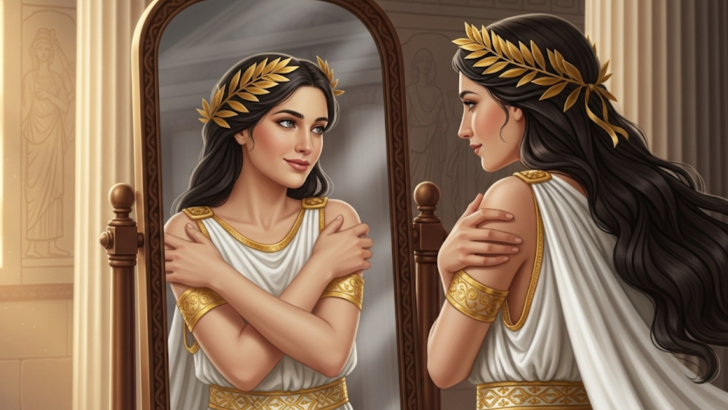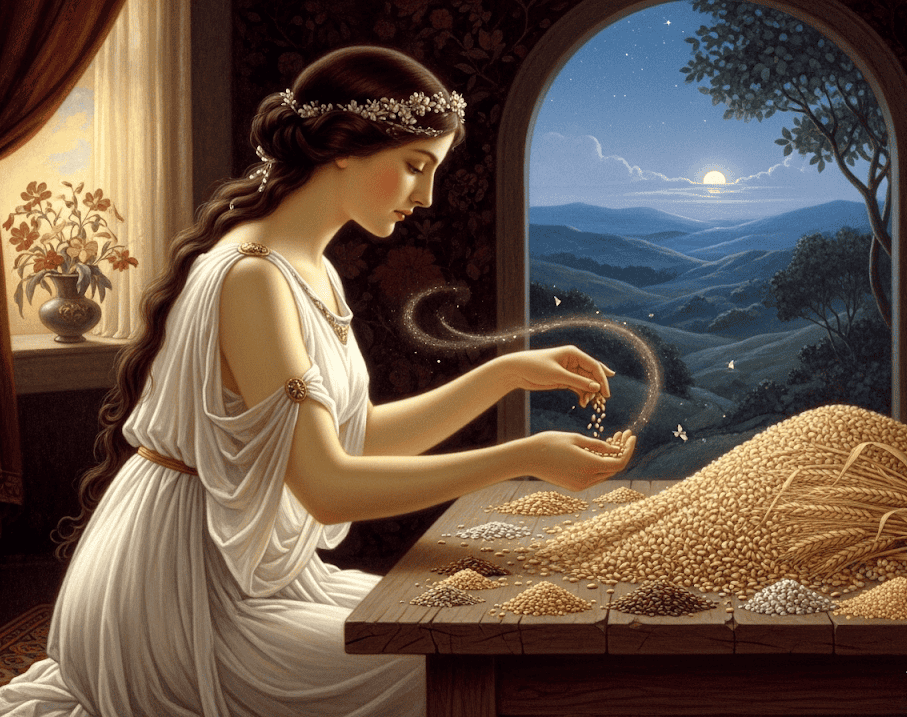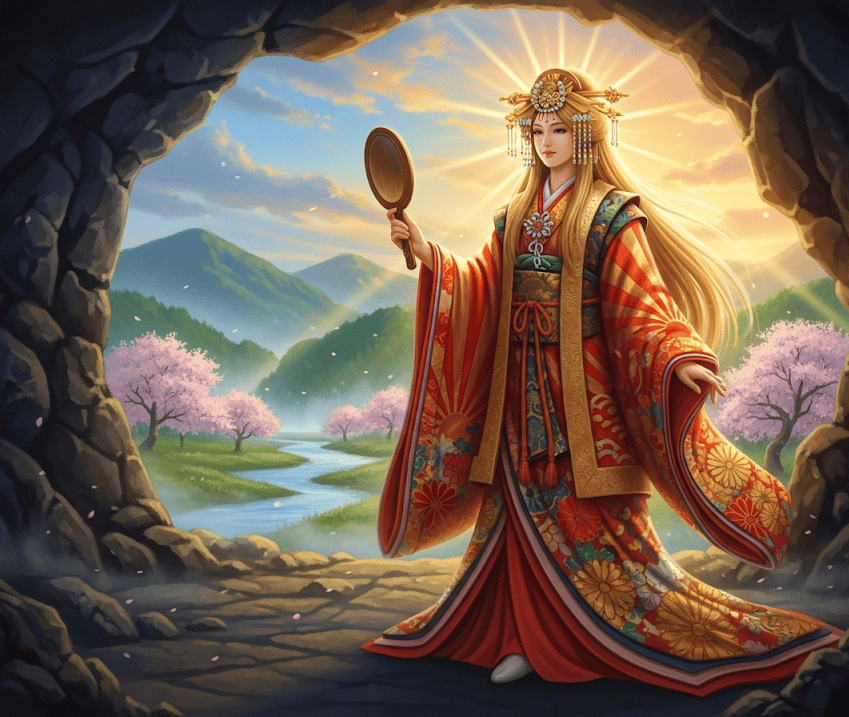Self-love can feel like one of the trickiest things to practice. We are told all the time to care for ourselves, but life, responsibilities, and comparison often get in the way.
Sometimes, the best reminders to honor who we are come from ancient stories. Myths are more than just old legends about gods, monsters, and heroes.
They often carried advice, warnings, or gentle nudges about how to treat yourself and others.
When you take a closer look, you’ll find that many myths from around the world whisper the same message: loving yourself is not selfish, it is survival.
Let’s explore seven fascinating myths that carry powerful self-love lessons.
1. Narcissus and the Mirror of Reflection (Greek Mythology)
The story of Narcissus is often told as a warning against vanity, but there is another layer worth exploring.
Narcissus was so captivated by his reflection that he could not look away. This obsession eventually consumed him.
While the myth is usually spun as “do not fall in love with yourself too much,” it also reminds us of the importance of balance.
Self-love is not about endless admiration in the mirror but about recognizing your value without losing touch with the world around you.
From this myth, the lesson is clear: self-love should nourish you, not isolate you. It is okay to admire yourself, to speak kindly about who you are, and to take joy in your own presence.
Just remember that the healthiest love is one that lets you connect outward, not just inward.
2. Psyche’s Journey to Reclaim Herself (Greek Mythology)
The love story of Eros and Psyche is one of the most beautiful in Greek mythology. Psyche, a mortal woman, was tested by Aphrodite, who made her complete impossible tasks.
Psyche faced trials like sorting grains in a single night and journeying into the underworld. Each challenge felt overwhelming, but she learned to trust her own strength, patience, and cleverness.
This myth teaches us that self-love often grows out of resilience. We sometimes underestimate our ability to carry heavy burdens until life forces us to try.
Psyche’s journey reminds us that the relationship you have with yourself must be rooted in faith. Believing you can endure, adapt, and grow is one of the most loving things you can give yourself.
3. Amaterasu and the Cave of Radiance (Japanese Mythology)
Amaterasu, the Japanese sun goddess, once hid herself in a cave after being deeply hurt by her brother’s cruelty.
The world fell into darkness without her light. Other gods tried to coax her out, but nothing worked until they held up a mirror at the cave’s entrance.
When Amaterasu saw her own reflection, she realized her radiance and returned to the sky, restoring warmth and life.
This myth offers a luminous self-love lesson: sometimes you need to remind yourself of your own light. Life has a way of dimming your spirit with criticism, setbacks, or pain.
But like Amaterasu, looking inward and recognizing your unique brilliance can bring you back to yourself. Self-love is seeing your worth even when others try to take it away.
4. The Rainbow Serpent’s Flow (Aboriginal Mythology)
In many Aboriginal stories from Australia, the Rainbow Serpent is a creator being that shaped the land and brought water, which gave life to plants and animals.
The serpent’s movements created rivers, valleys, and paths for others to flourish. Yet, the serpent also symbolizes balance – destructive when disrespected, nurturing when honored.
This myth teaches self-love through harmony. Your energy, like the serpent’s, flows outward to those around you.
But before you can nourish others, you need to respect your own needs. If you deplete yourself, your energy may dry up or lash out in frustration.
Loving yourself means honoring your natural rhythms—resting when tired, creating when inspired, and protecting your boundaries.
5. Oshun and the Sweetness of Joy (Yoruba Mythology)
Oshun, the Yoruba goddess of love, beauty, and rivers, is one of the most celebrated figures in African mythology.
She is associated with sweetness, honey, and the life-giving flow of water. In myths, when people forgot to honor her, she withdrew her waters, and life began to wither.
Only when her presence was celebrated did balance and fertility return. Oshun’s story teaches that joy is not optional; it is vital.
Self-love involves allowing yourself sweetness, laughter, and rest. Too often, we confuse productivity with worth, forgetting that pleasure also sustains us.
Oshun reminds us that treating yourself kindly and embracing joy are not indulgences, but acts of survival. When you love yourself enough to let joy in, you create ripples of harmony for others too.
6. The Celtic Swan Maidens and Freedom in Love (Celtic Mythology)
In Celtic tales, swan maidens are mystical women who transform between human and swan form, often by wearing magical cloaks of feathers.
Men who stole their cloaks trapped them into relationships, stripping them of freedom. When the maidens found their cloaks again, they returned to the skies and waters, reclaiming themselves.
These myths whisper a clear self-love truth: never give up your wings for someone else. Love should never mean losing your freedom, identity, or voice.
Healthy partnerships allow you to stay true to who you are. Loving yourself means refusing to shrink to fit another’s expectations. Like the swan maidens, remember that your freedom is sacred.
7. The Phoenix and Renewal (Egyptian and Greek Traditions)
The phoenix, a legendary bird, is known for its cycle of burning into ashes and rising again, more vibrant than before.
Across cultures, from Egypt to Greece, the phoenix became a powerful symbol of resilience, transformation, and renewal.
Its fiery rebirth is not about avoiding pain but embracing it as part of becoming stronger.
The phoenix teaches one of the most essential lessons of self-love: you are allowed to start over.
Sometimes self-love is about forgiving yourself for old mistakes, letting go of past versions of yourself, and stepping into new beginnings.
You may feel burned out or broken, but like the phoenix, you hold within you the ability to rise. Self-love is the fire that fuels your rebirth.

Ho sempre sentito una forte connessione con il Divino fin dalla mia nascita. Come autrice e mentore, la mia missione è aiutare gli altri a trovare l'amore, la felicità e la forza interiore nei momenti più bui.








